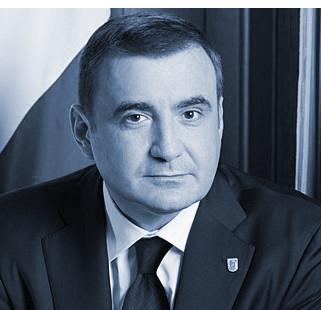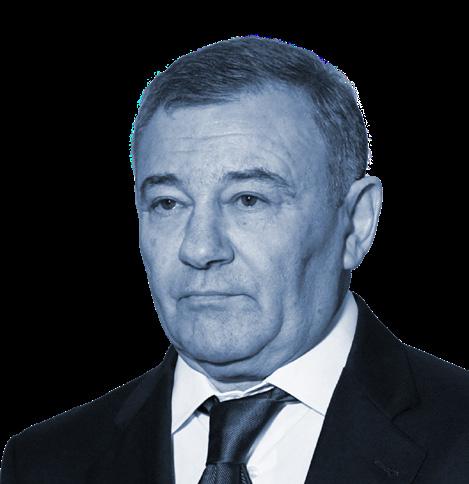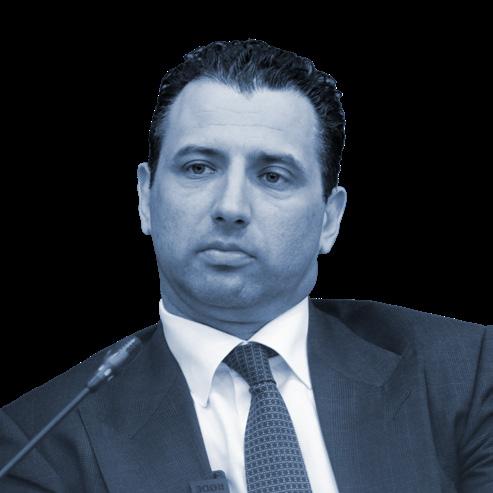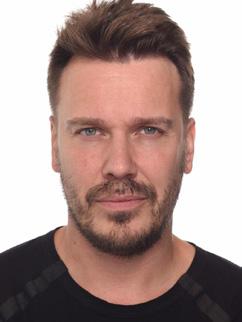




For years, Nikolai Patrushev was one of the most crucial figures in Russian power circles. As a former Federal Security Service (FSB) director and later secretary of the Security Council, he was widely considered the overseer of Russia’s intelligence agencies.
Patrushev also played an outsized role in shaping Russia’s foreign policy. He regularly published articles in the Russian press outlining the Kremlin’s worldview. His 2023 piece in Razvedchik magazine was effectively a manifesto of modern Russian anti-Americanism. Titled “The Collapse of Parasitic Empires,” it argued that Russia must lead the Global South in a struggle against US colonialism.
But last year, even Patrushev needed to trade his own demotion for his son’s career advancement.
At forty-seven, Dmitry Patrushev is the same age as Boris Kovalchuk, but he is by far the most senior of Russia’s rising “princes.” Like his father, he graduated from the FSB Academy. By the age of twenty-nine, he had already become a senior vice president at VTB, one of Russia’s largest banks. He later headed another major financial institution, Rosselkhozbank, before being appointed minister of agriculture in 2018.
In early 2024, Nikolai Patrushev lobbied hard for his son to become prime minister. However, under the Russian Constitution, the prime minister is the second-most powerful person in the country and automatically assumes the presidency if anything happens to Putin. According to Kremlin insiders, Putin is not yet ready to name an heir—especially not from one of the major ruling clans. He is simply unwilling to entrust his fate to the Patrushev family.
In the end, Dmitry Patrushev was appointed deputy prime minister in May 2024, and he was able to install his own loyalist as the new minister of agriculture. This was a modest promotion, but a promotion nonetheless. Meanwhile, Nikolai Patrushev was reassigned to the humiliating position of presidential aide for shipbuilding—a form of forced retirement.
The message to the old guard is clear: This is the fate that awaits all Kremlin veterans.

The biggest star among the younger generation of Russian bureaucrats is Aleksey Dyumin.
A former Putin bodyguard, he has been considered a potential successor to the president for nearly a decade. Last year, Putin appointed him to the key leadership position of secretary of the State Council.
Dyumin is known as one of Putin’s most trusted confidants. Once, while he was still working for the Federal Protective Service, Dyumin was reportedly guarding the entrance to the president’s residence in Valdai when he received a radio message: A bear was approaching the house where Putin was sleeping. And indeed, a large brown bear soon appeared right at the entrance. Dyumin decided to scare the animal away and fired a shot at its feet. The predator took fright and ran off.
The gunshots woke Putin, who demanded an explanation. After hearing Dyumin’s story, he praised his bodyguard for not killing the bear. Dyumin later recounted the episode to journalists. Since then, he has been known as the man who saved Putin from a bear.
Beyond his work as a bodyguard, Dyumin has had a rather curious career path. He was Putin’s personal adjutant. Then in 2014, as the head of the so-called Special Operations Forces (a unit within the Ministry of Defense), he was responsible for the occupation of Crimea. As deputy minister of defense, he oversaw the creation of Wagner Private Military Company.
In 2016, Dyumin was appointed governor of Tula Oblast, a region not far from Moscow that has long been home to several major arms-manufacturing enterprises.
Dyumin served as governor for nearly eight years, gaining a reputation as an effective administrator. It is worth noting that he was not the only bodyguard to be promoted. But unlike others, he actually proved himself and reached significant heights.
Sources suggest that Dyumin played a key role in the negotiations between Wagner Group head Yevgeny Prigozhin and the Kremlin during Prigozhin’s infamous June 24, 2023 mutiny. Notably, it was on the territory of Tula Oblast— Dyumin’s region—where Prigozhin’s forces, en route to Moscow, suddenly turned around and withdrew. It was also well known that Dyumin was highly critical of Shoigu, then the defense minister.
Last year, many expected Dyumin to succeed Shoigu as minister of defense. But Putin decided otherwise. Instead of giving him that post, he brought Dyumin into the Kremlin as his aide, effectively making him a shadow defense minister working directly alongside Putin. Putin does not like to drastically strengthen any one of his close associates; he prefers to maintain a balance and observe how his subordinates compete for influence. If Putin had appointed Dyumin as
Fifty-six-year-old Denis Manturov is at the height of his power. The first deputy prime minister is responsible for ensuring that the entire government is dedicated to the war effort. “Everything for the front, everything for victory” is his directive.
It is likely that he will remain in the ruling elite for some time. Manturov is the right-hand man of Sergei Chemezov, the head of Rostec, which controls the entire Russian military-industrial complex.
Chemezov—a former colleague of Putin’s from their Dresden days—is currently the most powerful figure in Russia’s economy. However, at seventy-two, he is expected to retire sooner than Putin despite being his contemporary. Manturov, as the most experienced and trusted official, is positioned to inherit his empire.
Another key figure is fifty-six-year-old Deputy Prime Minister Dmitry Chernyshenko. He entered the political elite through the 2014 Sochi Olympics, where he led the organizing committee and impressed Putin with his managerial skills. He is now seen as the most likely successor to Sergei Kiriyenko, the deputy head of the presidential administration overseeing domestic politics.
Sources have long speculated that Kiriyenko might be reassigned to oversee the occupied Ukrainian territories, likely with the rank of deputy prime minister. This move is expected to happen once active military operations in Ukraine wind down—something the Kremlin anticipates in the coming months. When that moment arrives, a reshuffle could follow. Chernyshenko would move into the presidential administration, while Kiriyenko would take his place in the government.
Sources say Putin has no particular complaints about Kiriyenko’s work. On the contrary, Kiriyenko has successfully managed political challenges, including multiple Russian elections and a constitutional referendum enabling Putin to remain in power until at least 2036. However, Kiriyenko has also led the Kremlin’s program for cultivating new leaders, which has produced a new generation of officials from whom Putin now selects key administrators. During his years overseeing domestic policy in the Kremlin, he created an entire system of competitions through which almost all young Russian officials have passed. First, there was the Leaders of Russia competition. Then the School of Governors was added, followed by the School of Mayors. Finally, after the invasion of Ukraine, a military-patriotic competition for bureaucrats called Time of Heroes was introduced.
As these new leaders grow in number, so does Kiriyenko’s influence. But the unchecked rise of any one player goes against Putin’s personnel strategy.
Kiriyenko will likely be reassigned to a more challenging territory to ensure that he doesn’t become too powerful.
Meanwhile, Kiriyenko’s protégés are increasingly populating the elite. Putin surely remembers Joseph Stalin’s famous slogan, “Cadres decide everything.” If Kiriyenko remains the Kremlin’s chief recruiter, he could become a serious contender in any future succession race—something it seems Putin is not yet ready to allow.


The rise of Russia’s new elite often comes with moments of unintentional comedy. Among the country’s powerful family clans, one stands out as the clearest example that there are no limits for “nepo babies” in Russia. This is the Rotenberg family.
Arkady Rotenberg is one of Putin’s closest friends. Like Kovalchuk, he holds no official government position, yet he is one of Russia’s largest state contractors in construction. His company built the bridge connecting Crimea to Russia (which has been attacked repeatedly since 2023) and is responsible for numerous projects in occupied Ukrainian territories.
Rotenberg and his brother Boris have known Putin since childhood; they trained in judo together as teenagers. This remains the foundation of their power. Unlike those of other clans, the Rotenbergs’ children have yet to display any political ambitions and none are seeking government positions. However, Arkady’s nephew, Roman Rotenberg, has found his own path through hockey.
Roman Rotenberg, now forty-four, spent his childhood in Finland and later in England. But after the family’s close friend Putin came to power, he returned to Russia. At thirty, he was appointed vice president of the dominant SKA hockey club. Within three years, he became vice president of the Russian Hockey Federation.
To professional hockey players, it was clear that Rotenberg was more of an enthusiastic fan than a real expert. After a game in 2018, he publicly criticized coach Oleg Znarok—who had just led the Russian national team to an Olympic gold medal. Znarok’s response was immediate and unfiltered: “You’re gonna teach me? Who the **** are you? Get the **** out of here, kid! Teaching me how to play hockey?” Znarok was promptly fired.
In 2022, Rotenberg appointed himself head coach of SKA and then made himself head coach of the national team as well. Sports journalists were stunned—he had no coaching experience whatsoever. But no one dared say it aloud. On television, commentators are forced to say exactly what Rotenberg wants to hear.
Rotenberg’s story appears to be a perfect symbol of Putin’s Russia: For the “princes,” nothing is off-limits. And because Russia has been banned from international competitions like the Olympics, there is no real opportunity for him to humiliate himself on the world stage.
even more orthodox and staunchly conservative than the generation of officials who were old enough to be his sons.
But when the decisive moment came, Castro still chose to hand power to his own brother, Raúl.
Putin has no brother, and he trusts no one. That’s why he is focused on grooming a new, younger, and thoroughly indoctrinated generation—one that he is confident will carry on his legacy.

Mikhail Zygar is a nonresident senior fellow at the Atlantic Council’s Eurasia Center. He is a Russian-American journalist, writer, and filmmaker, and the founding editor-in-chief of Russia’s only independent news television channel, Dozhd (TVRain).
Under Zygar’s leadership, Dozhd provided an alternative to Kremlin-controlled federal television channels by focusing on news content and giving a platform to opposition voices. The channel’s coverage of politically sensitive issues, like the Moscow street protests in 2011 and 2012 as well as the conflict in Ukraine, has been dramatically different from the official coverage by Russia’s national television stations. In 2014, Zygar received the CPJ International Press Freedom Award.
Zygar’s bestseller All the Kremlin’s Men (2015) is based on an unprecedented series of interviews with Russian President Vladimir Putin’s inner circle, presenting a radically different view of power and politics in Russia. Time named it “one of nine books to understand Russia.” His book The Empire Must Die (2017) portrays the years leading up to the Russian revolution and the vivid drama of Russia’s brief and exotic experiment with civil society before it was swept away by the Communist Revolution. It was named a Kirkus Reviews Best Nonfiction Book of the Year. His latest book, War and Punishment: Putin, Zelensky, and the Path to Russia’s Invasion of Ukraine, was published in 2023 and was featured on the New Yorker’s list of the best books of the year.
In February 2022, after Russia’s invasion of Ukraine, Zygar authored a petition against the invasion cosigned by Russia’s most prominent writers, artists, and scholars. In March 2022, he organized the only interview of Ukrainian President Volodymyr Zelenskyy for the independent Russian media.
In 2023, Zygar moved to New York. He’s now a press freedom fellow at the City University of New York’s Craig Newmark School of Journalism and is a visiting professor at Princeton University’s School of Public and International Affairs.
Zygar is openly gay and is married to African-Russian journalist Jean Michel Zygar Shcherbak.

CHAIRMAN
EXECUTIVE CHAIRMAN EMERITUS
PRESIDENT AND CEO
EXECUTIVE VICE CHAIRS
VICE CHAIRS
TREASURER DIRECTORS
Jarosław Grzesiak
Knežević
HONORARY DIRECTORS